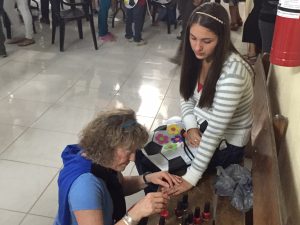Here is the next “bite” for your to digest as you prepare to join us on our next mission trip (or any trip) in 2016.
You can read the whole article, here; choke it down or just take it by the spoonful as I post them here.
2. Seek to serve, not self-glory
Don’t think about all the cool stories or photos you want to bring back, so you can show people what you have done. These missionaries are the people who have a heart for this nation and have sacrificed everything to be there every day – loving people and doing the hard stuff.
When you roll in and hand out a bunch of soccer balls and candy to the kids, it undermines the bridges of trust built through partnering, and instead sends the message of easy “aid” and spreads dependency. It makes it much harder on them when you leave and they wonder why this friend, who has been staying with them over years, never “gives them stuff.” If you have gifts, only bring what they have asked and let them hand it out at a time they deem appropriate.
Here are some ideas of things that might be helpful, but you should specifically ask your organization or missionary what their needs are. Maybe they need, I don’t know, CASH more than they need you to fly over. It’s not sexy, but I promise it will be a thousand times more helpful than building a house they could have gotten locals to build better.
The following are some more tips:
- Be a friend (offer counseling, support, encouragement to local staff; help them recharge)
- Pray and prophecy over them (bring fellowship to them because they miss that)
- Offer counseling, a retreat, a date night, or a babysitter. Do their nails or bring stuff over from America, like food supplies and vitamins
- Offer to pray over their national staff’s homes or make them dinner
- Be willing to help around the office with admin/tech issues
- Host a teaching or women’s conference (something of lasting value that you pay for). Give away the training you’ve received, most don’t have access to those resources and materials.
- Train staff in vocational education (something they can reuse or train their beneficiaries in)
- Raise money for them (this is how you can help long-term). Your greatest asset to them will be what you do with your time when you come back. Will you serve long-term? Volunteer? Spread the word?
- Listen to their guidance and don’t suggest programs they haven’t talked about (ask what their needs are and where you can best serve)
- Develop long-term relationships with the organization
- Don’t judge them (they know they have holes). Rather, encourage them and see where you can volunteer to fill holes.
Like I said in the first blog on this topic, not all of these ideas will apply to Finish the Work, but we can all learn a little from these thoughts and ideas.
What is your take-away from this bite?







